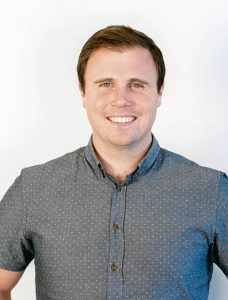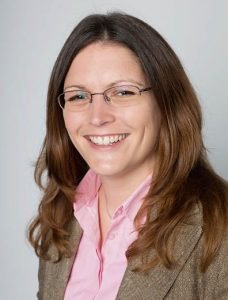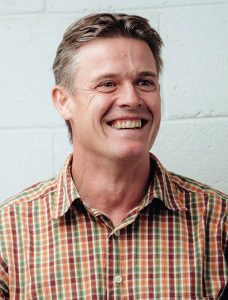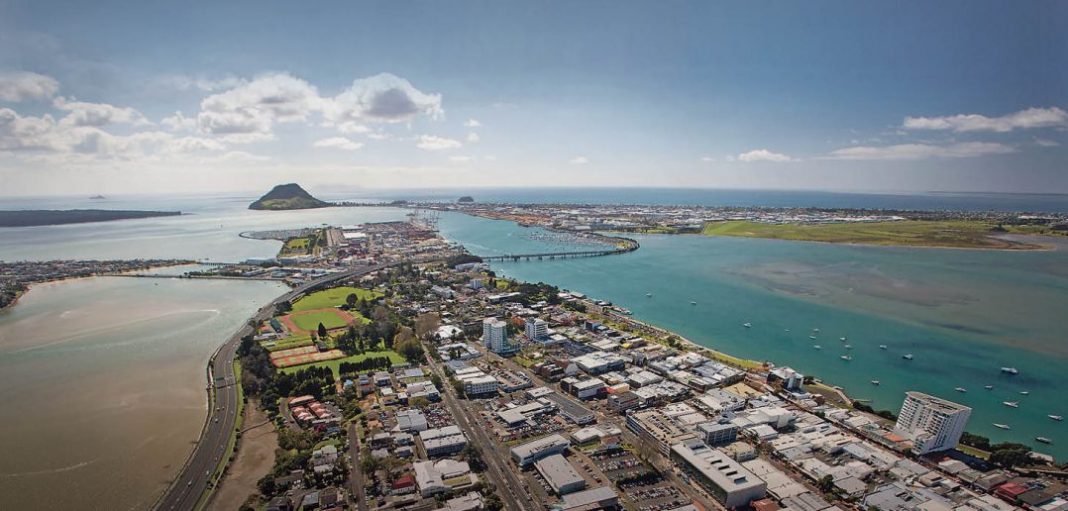The innovative thinking highlighted at Groundswell will include new ideas being implemented in the Bay on the circular economy. This is the phrase coined to describe the aim of redefining products and services at the design stage to reduce waste and minimise negative environmental impacts.
Dan Faris

Daniel Faris, chief executive of Locus Research, and Emily Townsend, sustainability engineer for ThinkStep Australasia, will co-present the “Think circular to spark innovation and collaboration” session at the RHUBARB Innovation Summit. Locus Research and ThinkStep have recently formed a new partnership.
“A lot of people assume that if you recycle something like a plastic bottle, it will come back around as a new plastic water bottle,” said Faris.
“But it doesn’t – it comes around as a lower grade hard plastic that maybe can be recycled a few times, but ultimately it will end up in landfill. It doesn’t fix the problem. The only way to really do that is to design products and systems that don’t create waste in the first place.”
Locus Research has built expertise on how to undertake the challenge of designing products for sustainability. The company’s founder Tim Allan – now focused on his role as chief executive of electric bike company Ubco – embraced the concept of so-called Life Cycle thinking a decade or so ago, said Faris.
That was when he first began working with people developing smart thinking about the issues, including Barbara Nebel, a former Scion scientist, who founded Life Cycle Assessment NZ, and is now the managing director of the Australasian arm of ThinkStep, a German business with offices throughout the world, focused on circular economy issues.
“Barbara and her team have always brought a scientific approach to how you measure your environmental impact,” said Faris.
ThinkStep had always done LCAs (Life Cycle Assessments), which looked at all the components of a given product or service, how sustainably they had been sourced, how it was manufactured, and the carbon footprint and the product’s end of life.
Emily Townsend

“That’s really useful,” said Faris. “What we’ve always wanted to do is learn how we can apply that creatively into the design of the product in the first place.”
The new Locus Research/ThinkStep partnership strengthens their relationship.
“We’ve got a really good meeting of the minds. They have fresh, sharp scientific thinking and an incredible database to benchmark products and materials. They are capable of making very effective judgments about how something is expected to perform. We bring the more creative and innovative side to that equation.
“By partnering with these guys, we can not only come up with an effective way of building or redesigning a product to be sustainable, but build it with proof that it will deliver the outcomes we have set up to achieve. And obviously all of this is really focused on pushing really hard towards the concept of a circular
economy.”
Faris said the circular economy concept had been around for some time, but had been difficult for people to conceptualise. However, the Sustainable Business Network has recently announced the first New Zealand circular economy conference for later this year.
“It’s becoming more in the public eye. Some people will tell you that recycling is circular, but it’s not, it’s ultimately linear. The goal is to design products and services that don’t need recycling, and that requires some clever thinking.”
Rhubarb encourages positive collaboration in the Bay
Rhubarb is a community of organisations championing the Bay of Plenty as a destination at the forefront of innovation, technology and talent development. Rhubarb stands for Resource HUB Assistance Reaps Benefits.
With members from various organisations across the Bay of Plenty, there’s a cross-section of talents and points of view making up this vital community. Their objective is to make the Bay of Plenty a sought-after location where technology minded people want to live, work, study and play. Rhubarb encourages an environment that fosters collaboration and challenges thinking in the collective network.
Ian Gray

The group want to provide a positive avenue for strategic executive engagement that drives business performance in the region, and connect the agencies that drive business engagement in the Bay.
Ian Gray, Rhubarb’s Secretary and Cucumber’s Business Manager, says the organisations is about organisations collaborating, learning and enabling their teams to thrive and grow.
“We encourage members to work together, think differently, share ideas and explore their talents. Rhubarb facilitates this through local events and forums with speakers from far and wide. It’s been a passion of mine for over eight years and the Innovation Summit will be a terrific opportunity for members and non-members in the region to get together, share experiences and learn something new from some amazing speakers.”
Rhubarb is holding a one-day Innovation Summit on 29 August as part of Groundswell, with the theme of “Transformational Technologies.” The summit aims to challenge thinking, create curiosity and engage regional leaders in how to transform through digital technology and manage an increasingly fast-paced environment.
With something for everyone, the event will covers a business and technology stream, and explore topics ranging from customer experience, the circular economy and the future of work, to cyber security, the Internet of Things, and augmented reality.
Key speakers include Simon Kennedy, Air New Zealand’s CIO, Russell Craig, National Technology Officer for Microsoft NZ, and Liz Maguire, ANZ’s Head of Digital and Transformation. With demonstrations of leading-edge technology on the day as well, this promises to be a compelling event for anyone involved in innovation, technology or the future of business.
For more information and tickets for the Rhubarb Innovation Summit, please visit: www.groundswellfestival.nz/rhubarb




